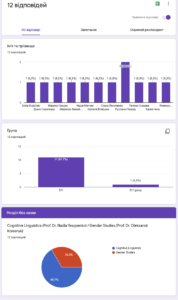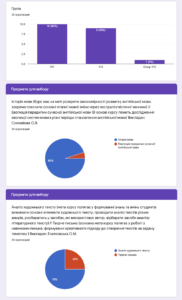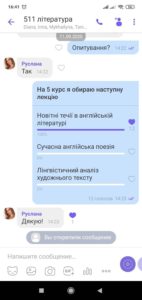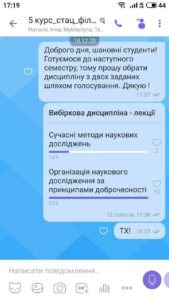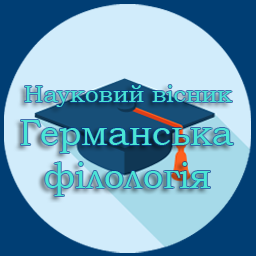Дисципліни вільного вибору
Освітня програма: Англійська мова і література та друга іноземна мова
Course Description
|
Course Description Students will have basic knowledge of and insight into the field of women’s and gender studies. The lectures will focus on factors of identity making such as gender, class, race, age, and sexuality. Students will have the academic skills to: Explore social and cultural relations in today’s globalised societies, in an interdisciplinary manner; Develop and implement sustainable perspectives in emancipation policies, diversity management, cultural initiatives, and political activism; Critically investigate power differences and processes of inclusion/exclusion, discrimination, and emancipation; Reflect on how academic, cultural, artistic, journalistic, and policy-making institutions respond to societal challenges. 1. The formation of social identities 2. Power differences in our globalised and mediatised world 3. Discrimination and exclusion 4. Gender, race, class, sexuality and age contribute in modern society 5. Emancipation 6. Social and cultural relations in today’s societies 7. Academic, cultural, artistic, journalistic, and policy-making institutions and modern societal challenges 8. Development of emancipation policies 9. Diversity management 10. Cultural initiatives and political activism |
||||||||||||||||||||||||||||||||||||||||||||||||||||||||||||
| Форма для голосування: https://forms.gle/M4UjTGA3ykE6XN8TA | Результати вибору: Вибіркові дисципліни (11 семестр, Філологія) (Відповіді) |
Дисципліни вільного вибору
Ступінь вищої освіти: Бакалавр
Спеціальність: 035 Філологія
Спеціалізація: 035.041 Філологія (Германські мови та літератури (переклад включно), перша – англійська
Освітня програма: Англійська мова і література та друга іноземна мова
Курс 3 Семестр 6 Навчальний рік 2020-2021 н.р.
Курс 5 Семестр 10 Навчальний рік 2020-2021 н.р.
| НОВІТНІ ЛІТЕРАТУРНІ ТЕЧІЇ
Викладач: к.ф.н., доц. Суродейкіна Т.В. Опис курсу: Лекції з курсу спрямовані на ознайомлення студентів з предметом новітньої англомовної літератури, його завданнями та проблематикою, з деякими ключовими поняттями, що є релевантними для філологічної діяльності. Особлива увага приділяється формуванню навичок самостійного критичного мислення, вміння інтерпретації інформації, що уможливлює адекватне сприйняття текстів різних літературних течій та шкіл. Наукові роботи з новітньої літератури мають на меті контроль знань з цієї дисципліни, перевірку вміння студента критично осмислювати художню літературу, розкрити обрану тему, логічно та лінгвістично грамотно викласти свої думки. Вони розглядають актуальні проблеми літературознавства, які не знайшли достатнього висвітлення у наукових працях. Мета навчальної дисципліни: ознайомити студентів факультету іноземних мов із новітньою періодизацією англомовної літератури; розкрити особливості кожного періоду стосовно його зародження та розвитку; встановити та пояснити стилі, течії та напрямки на різних рівнях розвитку літератури. Підвищення рівня підготовки студентів із новітньої англомовної літератури сприятиме науковому розумінню теоретичних основ вивчення літератури сьогодення на рівні сучасного статусу науки про літератури, а також навчить студентів робити порівняльний аналіз та розбиратись у творчості авторів та літературних віяннях.
|
СУЧАСНА АНГЛОМОВНА ПОЕЗІЯ
Викладач: к.ф.н., доц. Суродейкіна Т.В. Опис курсу: Лекції з курсу спрямовані на ознайомлення студентів з предметом сучасної англомовної (британської та американської) поезії, його завданнями, проблематикою та ключовими поняттями. Особлива увага приділяється формуванню навичок самостійного критичного мислення, вміння інтерпретації інформації, що уможливлює адекватне сприйняття текстів різних літературних течій та шкіл в історично-культурному аспекті. На перше місце висувається постать автора та його прагматичні настанови. Дипломні роботи з сучасної англомовної поезії мають на меті перевірку вміння студента критично осмислювати поетичні тексти, розкрити обрану тему, логічно та лінгвістично грамотно викласти свої думки. Вони розглядають актуальні проблеми поетики, які не знайшли достатнього висвітлення у наукових працях. Мета навчальної дисципліни: ознайомити студентів факультету іноземних мов із сучасною періодизацією поезії в рамках англомовної літератури; розкрити особливості кожного періоду стосовно його зародження та розвитку; встановити та пояснити стилі, течії та напрямки на різних рівнях розвитку літератури. |
| Лінгвістичний аналіз англомовного літературного твору
Викладач: к.ф.н., доц. Суродейкіна Т.В. Course description: The course of literary text analysis teaches students to understand, evaluate, analyze and respond critically to works of fiction. There is a particular focus on what the author tries to accomplish within a text and on elements that work together in a text for a certain purpose. Literary texts are explored in terms of genre peculiarities, themes and ideas, points of view and character variety, plot structure, and diction idiosyncrasy. A crucial aspect of the course is evaluating the quality of the text language on different levels . The course is a valuable elective as it will enable the students to enjoy works of fiction by modern authors, develop their critical analysis skills necessary for successful research papers and contribute to students’ preparation to a state examination. The course book will walk students step by step through the process of literary text analysis to: o introduce them to the main approaches and principles of literary text analysis; o develop their close reading and critical reflection skills; o strengthen their ability to identify the genre and point of view, formulate themes, ideas and messages, analyze plot and conflict; o help them to interpret and explain the author’s choice of words and syntactic structures, the meaningfulness of symbolic and figurative language; o inspire them to demonstrate their personal understanding of the text and refine their writing skills. Literary text analysis classes will provide an active learning environment that encourages group discussion, teamwork, independent study and creative thinking.
|
Результати голосування студентів 5 курсу весняний семестр 2020/2021 н.р. |
Опис вибіркових дисциплін спеціальність «Філологія» 2020



